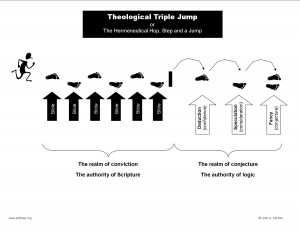All of life is to be processed Biblically. As we think our way through life we attempt, rightly, to process life theologically. As we make our way down the path of life one step at a time, we attempt to plant our feet on solid Bible truth. We aim to make each thought correspond to truth that can be identified with a chapter and a verse. We want to think the thoughts of God after Him.
In this regard God’s revelation is full and sufficient (2 Tim. 3:16; 2 Pet. 1:3-4). All that God has told us is true. Yet God has not told us all that is true. There remain matters which are not revealed to us. “The secret things belong to the LORD our God, but the things that are revealed belong to us and to our children forever, that we may do all the words of this law” (Deut. 29:29). God is beyond tracing out (Rom. 11:33). No amount of mental exertion will allow us to break through beyond the veil of revelation. We can’t figure God out. He is infinite. We are finite. We are at the mercy of His revelatory grace.
What God has revealed is clear. What God has not revealed remains a mystery. We may rest assured that what is not revealed will be consistent with what has been revealed. We are not, however, exactly sure just how that consistency extends out beyond what God has revealed of Himself and His ways. What God has revealed is breathtaking (Rom. 11:33-36). What God has not revealed remains a mystery.
To this end we must be wise as we approach the limits of God revelation on any given subject. There comes a moment in our step-by-step process of thinking through life Biblically that we reach that boundary of what God has clearly revealed. Beyond that boundary we must tread cautiously. God is rational. God has made us in His image, part of which is being rational creatures ourselves. Thus logic is a gift from God. But the limits of our finite minds fetter this gift from its perfect fullness, at least in this life. We are welcome to telescope our thoughts logically outward from what we know clearly from the Bible. This is where the “hop, step and a jump” of theological thought come in. We reason our way through the Scriptures, under the ministry of the Holy Spirit. But then, having come to the limits of what God clearly says, we make a logical leap—a deduction. This deduction is a logical leap launched from solid Biblical truth with a chapter and verse. Yet the deduction itself does not have such clear, firm footing. This deduction makes sense to us and we may feel a sense of confidence in our conclusion, but the ground beneath our feet is less solid than just one step prior.
From this we may take another leap, logically of course. This we might call speculation. This is worthy of our Biblically-informed consideration. In eternity it might even prove to be true, but we don’t know this with revelatory certainty. Awareness that we are presently two steps removed from the firm footing of solid Biblical revelation is urged. It doesn’t mean the thought is untrue necessarily, but our level of confidence in that thought and particularly our level of confidence in pressing this thought upon others is diminished.
We may feel the urge to make yet another leap of logic. To do so is not wrong and we should not feel guilt for doing so. We must, however, be clear just what we are undertaking. We are now three logical steps removed from the solid clarity of what God has revealed in the Bible. We have arrived in the land of fancy and conjecture. We must be exceedingly cautious about such conclusions and especially about pressing these conjectures upon others as “Biblical.”
God wants us to live with conviction, based upon a clear understanding of what He has clearly revealed to us in the Bible. We can thus live under the authority of Scripture. God invites us to think! The ability to launch into the realm of conjecture is a God-given gift, but one which comes with an appropriate warning label. In the land of conjecture any deductions are made on the authority of logic (flawed and fallen and not yet fully transformed, Rom. 12:2), not on the authority of God’s revelation in the Scripture.
